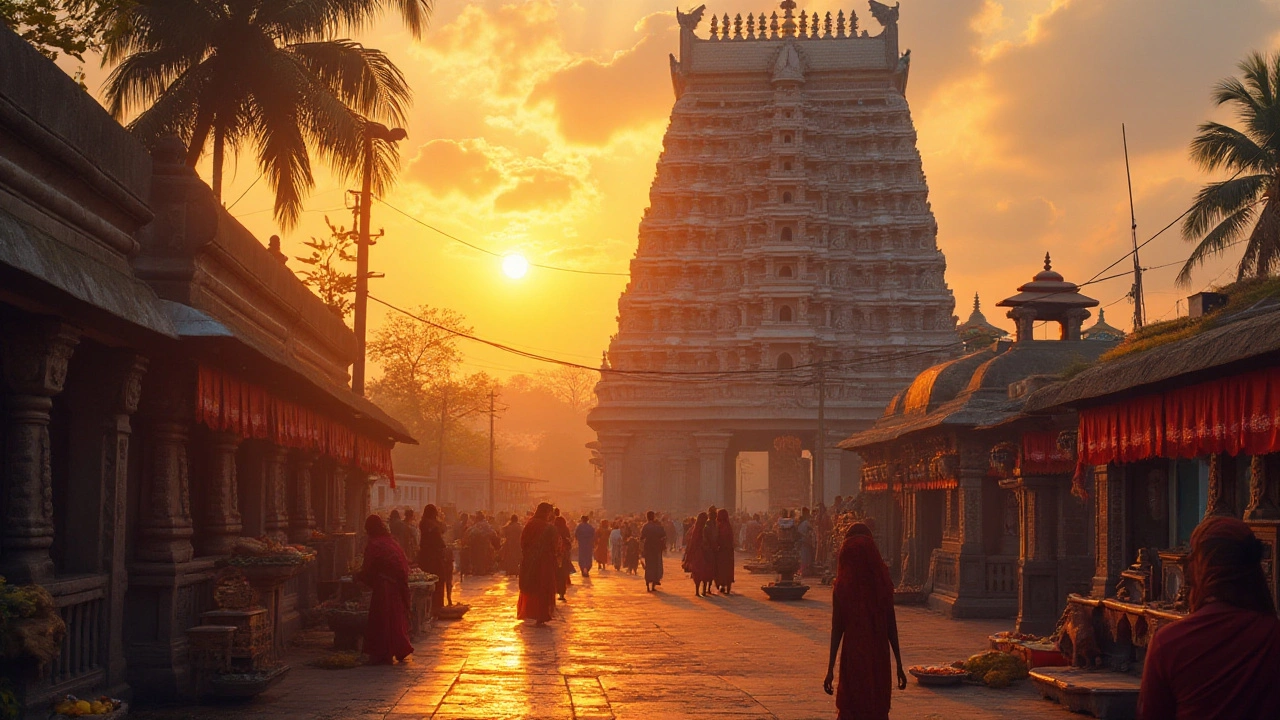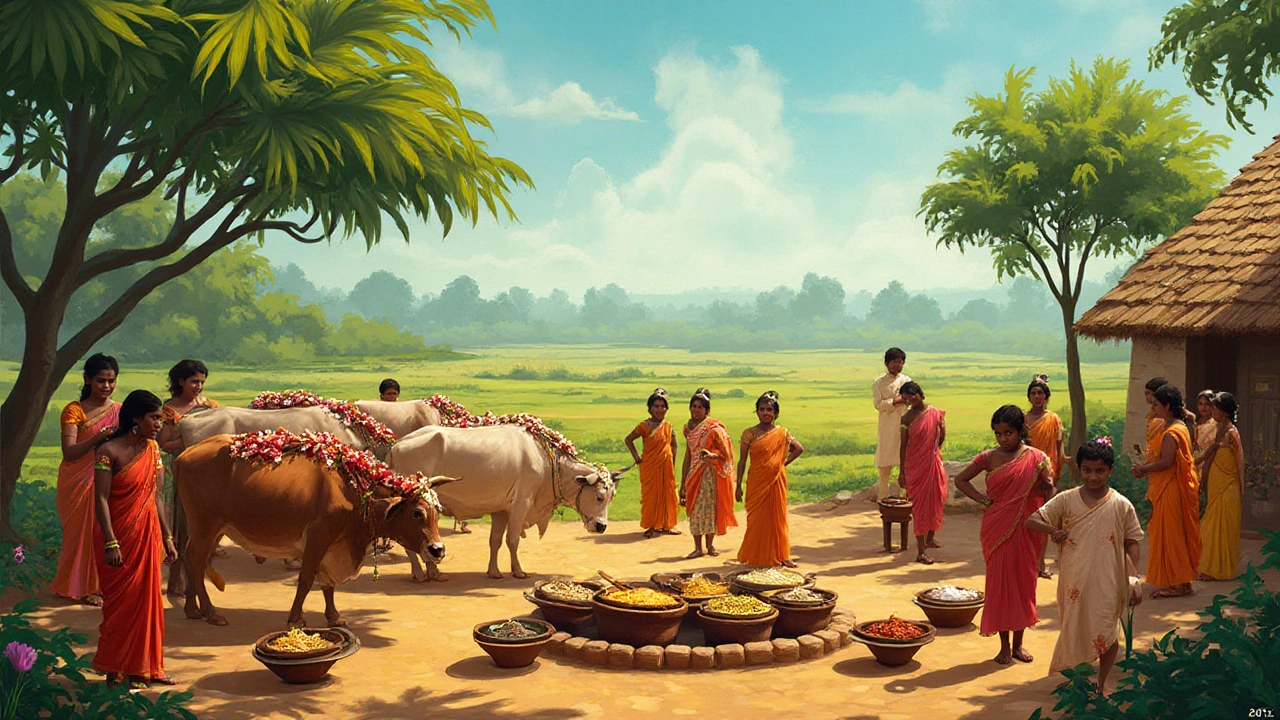Tamil culture waves an intricate tapestry of traditions and beliefs that have withstood the test of time. Primarily located in southern India and northern Sri Lanka, the Tamil people uphold practices that have been nurtured across millennia. Their beliefs are not just spiritual but also deeply interwoven with their language, arts, and social fabric, making Tamil culture uniquely captivating.
Whether it is the celebration of vibrant festivals or the profound respect for the Tamil language, these cultural practices reflect a harmonized blend of the past and present. Tamilians hold a profound spiritual connection that influences not only faith but also customs, showing how their lives are an embodiment of centuries-old wisdom.
- Historical Roots and Spiritual Beliefs
- Language, Literature, and Learning
- Festivals and Rituals: Celebrations of Life
- Family and Community: Pillars of Tamil Society
- Impact of Beliefs on Daily Tamil Life
Historical Roots and Spiritual Beliefs
The Tamilian beliefs stretch back through centuries, deeply rooted in the blend of history and spirituality that defines their culture. The ancient Tamil civilization, known for its intellectual contributions and maritime prowess, dates back as far as 500 BCE, flourishing in the Sangam period. This epoch was characterized by a flourishing of literature, particularly poems, that captured the Tamil people's reverence for the divine, nature, and humanity. The spiritual beliefs of the Tamilians are a rich tapestry woven with the threads of Hinduism, though they have also been influenced by Jainism and Buddhism throughout history. The Tamil landscape is dotted with temples, each a testament to their enduring faith, such as the magnificent Brihadeeswara Temple in Thanjavur, which stands as a UNESCO World Heritage site.
The foundation of Tamil culture lies in the belief of a harmonious connection between the universe and humanity. Their spiritual practices often center around temple worship, where rituals are meticulously performed to honor Hindu deities. Devotees participate in complex ceremonies and festivals, often involving processions, music, and dance, such as Bharatanatyam, which is not just an art form but a spiritual offering. The Tamil calendar is punctuated by numerous festivals, with Pongal celebrated as a thanksgiving to nature and deities like Sun God. As a predominantly agrarian community in the past, their practices include rituals that pay homage to the elements and agricultural cycles, demonstrating a profound respect for nature's abundance.
"The ancient Tamilakam comprised a vast expanse of southern India, and its people have a unique cultural identity shaped by millennia of philosophical and religious evolution." — Dr. Meenakshi Sundararajan, Tamil historian
Tamilians hold sacred language and literature, with Tamil being not just a medium of expression but a divine entity worthy of reverence. This language, one of the oldest in the world, is considered a manifestation of divine order, with scriptures and hymns like the Thirukkural illustrating moral and ethical principles. The Tamilians’ belief in karma and dharma, action, and righteous living, reflects in their community-centric lifestyle. They maintain a system of castes and communities where each has a unique role, bound by customs and duties passed down through generations. Such societal structure often underscores their spiritual and daily life, ensuring tradition remains alive in the modern age.
Another spiritual aspect of Tamil traditions is the emphasis on individual and collective well-being, intertwined with religious and philosophical teachings. These beliefs are emphasized in religious scriptures, ancient Tamil literature, and through the sayings of revered saints like Thiruvalluvar. The tenets of these beliefs are often seen in their approach to healthcare, education, and social governance, which strives for a balance between material and spiritual well-being. Thus, understanding Tamilian beliefs offers insights into how an ancient civilization sustains its spiritual journey amidst modern challenges, ensuring a legacy of profound cultural wisdom continues to thrive.
Language, Literature, and Learning
Among the diverse cultures around the world, the Tamil culture holds a special place due to its deep-rooted celebration of language, literature, and learning. The Tamil language, one of the oldest classical languages still spoken today, is regarded as not only a means of communication but also a spiritual and cultural emblem by Tamilians. Revered for its rich history and literary tradition, the language has a charm and depth celebrated across generations. Tamilians pride themselves on the preservation of their language, often imparting its nuances to successive generations to sustain its vibrancy and relevance.
Emerging over two millennia ago, Tamil literature has produced works that are considered a literary treasure. The Sangam literature, comprising poems that date between 300 BCE to 300 CE, is an anthology of ancient Tamil poetry, illustrating life, love, and heroism with stark beauty and insight. These works have been monumental, representing a comprehensive understanding of early Tamil society and culture. The language's versatility is further displayed through its evolving corpus, from classical epics like ‘Silappathikaram’ to contemporaneous works that blend tradition with modern-day narratives. Often, scholars and poets have drawn parallels between Tamil literature and other classical works, underscoring its significance and timelessness.
"Tamil is not just a language, but the breath and identity of those who speak it," observed the renowned Tamil poet Bharathiar, echoing the emotional and cultural connection that Tamil people share with their language. This deep-seated respect is reflected ubiquitously in Tamil Nadu's education system, where the learning of Tamil is emphasized from an early age, fostering a love and appreciation that is unique to the community.
The importance of learning in Tamil culture cannot be overstated. There is a prevalent emphasis on education as a means of empowerment and growth within the Tamil community. In both historical and contemporary contexts, education has been regarded as the primary tool for societal advancement and personal development. This philosophy is evidenced by the proliferation of learning institutions in Tamil Nadu, where there is a concerted effort to promote both modern education and classical subjects. From science and technical disciplines to music and traditional dance, Tamil education offers a holistic approach, equipping individuals with diverse skill sets and promoting cultural literacy.
The commitment to the preservation and enrichment of Tamil traditions through language and literature finds a concrete expression in various cultural festivals and educational programs. Celebrations such as the Tamil Conference and the Chennai Literary Festival are testaments to the thriving literary culture. These events often showcase literary works, language art forms, and promote dialogues on the relevance of Tamil in global contexts. Through these platforms, Tamilians continue to honor their heritage, while also engaging with a global audience, ensuring that the rich tapestry of Tamil language and literature is appreciated worldwide.

Festivals and Rituals: Celebrations of Life
The vibrant tapestry of Tamil culture is never more alive than during their numerous festivals and rituals, which are celebrated with fervor and joy across Tamil Nadu and beyond. These celebrations are not merely occasions for festivity but are deeply rooted in the spiritual and cultural ethos of the Tamil people. Each festival often has its own unique blend of religious, social, and cultural functions, marking the seasons, honoring deities, and reinforcing community bonds. One of the most significant festivals is Pongal, an ancient harvest festival that usually takes place in January. During Pongal, families gather to give thanks for the year’s harvest by preparing a traditional dish known as 'Pongal' from freshly harvested rice. This festival not only highlights the importance of agriculture but also showcases the Tamil’s reverence for nature.
Another key festival, Diwali, known as the festival of lights, sacrifices sleep to defeat darkness by vanquishing gloom with the radiance of numerous oil lamps and sparklers. This festival is celebrated with as much religious sentiment as it is with a cordial exchange of sweets and gifts among neighbors and relatives, underscoring the Tamil ethos of generosity and togetherness. Another widely celebrated festival is Tamil New Year, which is observed in April, marking the onset of a new cycle of life and time. On this day, families pay homage to their ancestors and start the day by viewing 'Kani', an arrangement of fruits, flowers, and auspicious items, as a symbol of abundance and prosperity for the year ahead.
Central to these celebrations is the intricate array of rituals that are meticulously conducted to honor deities and strengthen family ties. For instance, during Thaipusam, devotees perform extraordinary acts of devotion like carrying burdens or piercing their bodies with hooks to honor Lord Murugan. This is a festival that reflects extreme faith and the resilience of the human spirit. Such rituals are not only demonstrations of faith but also serve as reminders of the enduring connection between the present generation and their cultural heritage. They embody the essence of Tamil traditions, fostering a sense of identity and spiritual fulfillment.
Intricately woven into the social fabric, these festivals are platforms where the richness of Tamil traditions and beliefs are passed down. They are celebrated with the participation of entire communities, often featuring folk music, dance, and traditional arts, thereby preserving the artistic heritage of the Tamil culture. Language plays an integral role here too, as Tamil hymns and songs are often used in worship, showcasing the inseparable bond between the Tamil language and their religious practices. These festivals remind us of the universal themes of peace, prosperity, and community, binding the Tamil people together in a shared cultural experience.
In a quote reflecting the cultural significance, respected author Dr. Ananda Coomaraswamy once said,
"The dance of Shiva is the dance of the universe, it is the dance of subatomic matter."This encapsulates the core of Tamil festival rituals, emphasizing how spirituality and daily life are intertwined in a cosmic dance. The festivals of the Tamil people are not just ceremonies; they are living expressions of a culture that values its roots and harbors a profound respect for the natural world around them. Such celebrations cement the cohesion of Tamil communities across the globe, acting as a bridge between past heritage and future legacy.
Family and Community: Pillars of Tamil Society
In Tamil culture, family stands at the heart of existence, acting as a powerful backbone that holds society together. The Tamilian way of life emphasizes the value of familial bonds, advocating for joint family systems where multiple generations live under one roof. This promotes a cohesive environment where elders are respected and their wisdom sought in decision-making. Children grow within a nurturing environment, learning cultural values and traditions firsthand, which reinforces a collective identity among community members.
A defining trait of Tamilian society is their steadfast focus on communal harmony and social relationships. Community gatherings are a regular feature, whether it's during vibrant festivals like Pongal or solemn occasions, bringing people together and fostering a sense of belonging. Such gatherings aren’t just about celebration; they serve as a platform for cultural exchange and reinforcement of shared values. Importantly, underlining these interactions is a shared reverence for mutual respect and social duty, key aspects that uphold the Tamil traditions.
The role of women in Tamil families is integral and honoring their contribution is woven into the cultural consciousness. Women are often seen as custodians of culture, ensuring traditions are passed down to the next generation. This respect and centrality accorded to women play a pivotal role in family dynamics and cultural preservation. In the words of the renowned Tamil scholar, Thiruvalluvar, "The strength of a home is the virtue of its woman" - a sentiment that echoes throughout Tamil homes, carrying its philosophy through ages.
In terms of statistics, Tamil Nadu, predominantly populated by Tamilians, boasts some of India's best education and literacy rates, reflecting not only the emphasis on family values but a community-wide commitment to learning. This commitment ensures that traditions are respected, yet there's an allowance for evolution in the community’s shared values and techniques in education. As these family units flourish, they create ripple effects that extend beyond individual households, nurturing an entire community that’s self-sustaining, forward-looking, yet deeply rooted in its historical legacy.

Impact of Beliefs on Daily Tamil Life
Tamil beliefs deeply permeate the daily life of the Tamilian people, shaping routines, interactions, and the very environment in which they live. From the beginning of the day, these beliefs can dictate behaviors. For example, a typical morning in a Tamil household may start with the lighting of a lamp and a small prayer, a tradition seen as a way to invite auspiciousness and clarity. This practice also underscores the spiritual aspect that plays an essential role in setting the mood and tone for the day.
Their belief system also strongly values the presence and importance of nature. This is visible in the common practice of kolams, intricate designs drawn with rice flour at the entrance of homes. These designs, routinely created by women, serve not only as symbols of decorative art but also have a deeper symbolic meaning, representing a welcome gesture to both guests and deities. The use of rice flour is significant as it also feeds small creatures like ants and birds, showcasing a respect for all living beings.
Furthermore, family ties are deeply embedded in Tamilian beliefs, dictating social interactions and responsibilities. The joint family system is prevalent, where multiple generations live under one roof, facilitating a robust support system. Elders are venerated, and their blessings are considered crucial for any successful venture. The younger members learn to respect and care for their family, ensuring that traditions and values are passed down from one generation to the next. This practice strengthens not just familial bonds but also a shared cultural identity.
In daily Tamil life, one can also observe the manifestation of beliefs through language and art. The Tamil language itself, seen as more than a medium of communication, is an identity symbol. Historically rich literary traditions, with famed texts like the Thirukkural, provide ethical and philosophical guidance, continually influencing the morals and ethics observed in daily interactions. Art in the form of music and dance, like Bharatanatyam, is often intertwined with mythology and religious stories, providing entertainment and a spiritual connection.
The culinary practices of Tamilians are similarly guided by their beliefs. The traditional vegetarian cuisine, for many, is an extension of the principle of ahimsa—non-violence. This is especially true in temples, where offerings to deities are strictly vegetarian. It signifies purity and devotion to gods. Meals often begin with a small prayer of gratitude, a practice reminding individuals of the value of food and the labor that goes into producing it.
The numerous festivals celebrated throughout the year are vibrant examples of Tamil traditions. Festivals like Pongal, which celebrates the harvest, showcase the agrarian beliefs of Tamil society. During such events, community participation is encouraged, strengthening social bonds. It's a time when the collective joy and religious fervor bring people together, reflecting the strong influence of cultural beliefs on communal harmony.
"Our traditions are not just rituals; they are threads that connect us to our roots, ensuring that every Tamilian, wherever they may reside, carries a piece of home within them."
